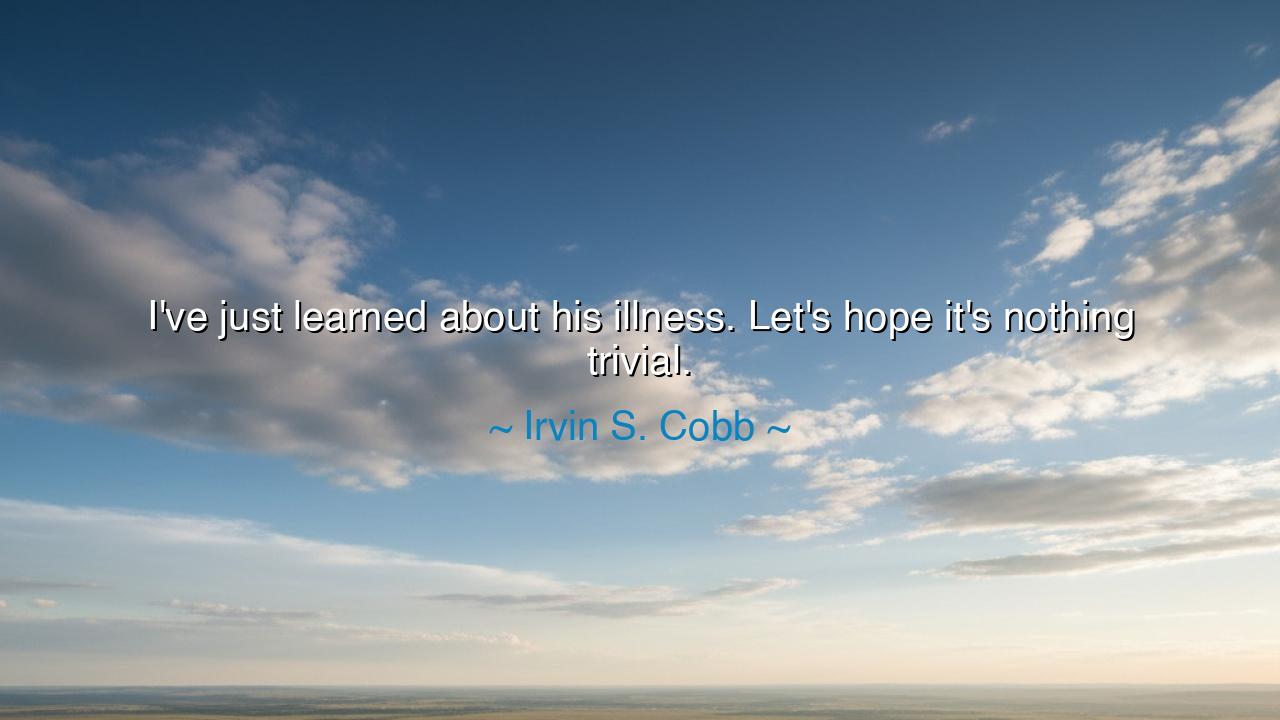
I've just learned about his illness. Let's hope it's nothing






Hear now, O seeker of meaning, the sharp and timeless words of Irvin S. Cobb, a man whose wit was as keen as a blade and whose humor cut to the heart of human folly. He once said, with both jest and judgment: “I’ve just learned about his illness. Let’s hope it’s nothing trivial.” At first hearing, the line stings with irony — a cruel jest, perhaps, at another’s expense. But beneath its brilliance lies a deeper reflection on envy, pride, and the strange joy men take in the downfall of others. For Cobb, master of satire, was not merely laughing at the ill — he was exposing the sickness that lies in the human spirit itself, that shadowed part which delights in weakness, even as it fears its own.
Irvin S. Cobb, born in Kentucky in 1876, was a journalist, humorist, and playwright known for his sharp tongue and sharper insight. He lived in an age when wit was both weapon and mirror — when men revealed truth by laughing at it. His remark, likely uttered in the spirit of dark humor, carries an ancient truth disguised as a jest: that we humans, for all our sympathy, are often bound by pettiness, by the secret wish that misfortune might visit others and leave us unscathed. When he says, “Let’s hope it’s nothing trivial,” he turns kindness upon its head — mocking the false compassion that masks malice and pride.
To understand the power of this line, one must hear it as the ancients would — not as insult, but as revelation. For there has always been a tension in the human heart: the pull between generosity and jealousy, between empathy and ego. Even in the time of Sophocles, it was said that “No man loves his neighbor’s good fortune unless it profits him as well.” And so, Cobb’s humor reveals what most would hide — that when others fall, we often find a secret comfort in knowing we still stand. His jest is a mirror held up to our frailty, reflecting not the sickness of one man, but the disease of the soul that hides beneath polite society.
Consider, if you will, the tale of Diogenes the Cynic, that philosopher who lived in poverty but mocked the pride of kings. When told that a rival philosopher had died, Diogenes is said to have shrugged and replied, “Why should I mourn? The world remains full of fools.” His words, like Cobb’s, carry both cruelty and clarity. They remind us that behind our polite condolences, we often harbor disdain, or perhaps indifference. But those who live only in envy and judgment die in spirit long before their bodies fail. For the true sickness is not of the flesh, but of the heart that cannot rejoice in another’s joy nor grieve sincerely at another’s pain.
Yet in Cobb’s irony there is also wisdom. He teaches, by contrast, the value of authentic compassion. His biting humor forces us to ask: when we offer pity, is it genuine, or is it performative? Do we comfort others because we care, or because it makes us feel virtuous? The joke, though cruel, becomes a test of our own sincerity. The ancient teachers would have called this a form of moral alchemy — where poison becomes medicine, where laughter reveals truth. By mocking false sympathy, Cobb invites us to practice the real kind: not words spoken out of duty, but love expressed through understanding.
In this way, his remark serves as a warning — against hypocrisy, against vanity, against the easy pleasure of mockery. We must learn, as wise souls before us have, that there is no greatness in sneering at the fallen, and no dignity in wishing harm upon those we dislike. Life, in its cruel mercy, humbles all. The wheel of fortune turns, and today’s strong may be tomorrow’s weak. Thus, we are commanded by experience itself: do not hope that another’s illness is severe, nor that your own blessings endure forever. The truest hope is for healing — of body, of heart, of the shared humanity that binds us all.
So let this teaching dwell within you: when you hear of another’s suffering, whether friend or foe, cast away the impulse to measure it or mock it. Compassion is the highest wisdom, for it cleanses the soul of bitterness. If you must laugh, let it be laughter that heals, not laughter that wounds. Let Cobb’s jest, sharp as it is, remind you that the line between humor and cruelty lies in the intention of the heart.
And when the day comes when illness, failure, or sorrow finds you — as it finds all mortals — may you be met not with mockery, but with mercy. For in that moment, you will know the full truth of Cobb’s words: that behind every trivial jest lies the eternal question — will we choose to wound, or to understand?






AAdministratorAdministrator
Welcome, honored guests. Please leave a comment, we will respond soon